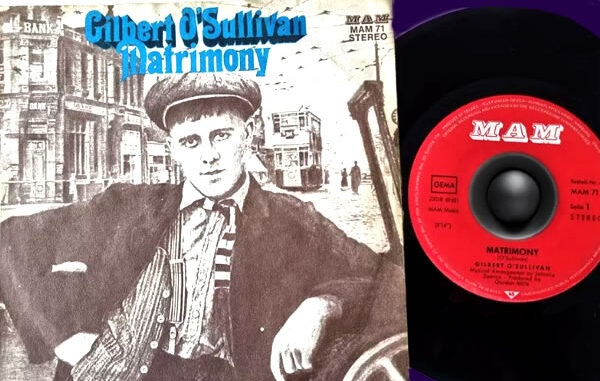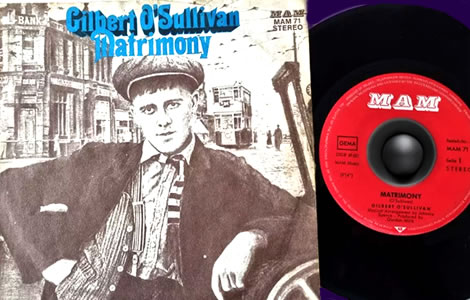
Gilbert O’Sullivan, born Raymond Edward O’Sullivan on December 1, 1946, in Waterford, Ireland, emerged as one of the quintessential pop stars of the 1970s.

Known for his distinctive voice and catchy melodies, O’Sullivan’s music captured the spirit of the era. His hit single “Matrimony” stands out as a significant milestone in his career, marking his place in the pop music pantheon.
The Chart Success of “Matrimony”
“Matrimony,” released in 1972, became an instant hit, resonating with audiences worldwide. In the UK, the song climbed the charts, peaking at number 4.
Its catchy tune and relatable lyrics about wedding jitters struck a chord with many listeners. In the US, while it didn’t reach the top of the charts, it still garnered significant airplay, highlighting O’Sullivan’s growing international appeal.
In Europe, “Matrimony” found success in several countries, particularly in Germany and the Netherlands, where it made it into the top 10. The song’s success in Asia, especially in Japan, was remarkable. Japanese audiences appreciated O’Sullivan’s melodic style, and “Matrimony” helped cement his popularity there.
Other Hits Before and After “Matrimony”
Before “Matrimony,” O’Sullivan had already made a significant impact with his 1970 single “Nothing Rhymed,” which reached number 8 in the UK.
The song showcased his knack for writing poignant lyrics set to memorable melodies. His debut album, Himself, released in 1971, was also well-received, featuring tracks like “Alone Again (Naturally)” which became one of his biggest hits.
“Alone Again (Naturally),” released in 1972, was a massive success, topping the charts in the US and UK. The song’s melancholic lyrics about loneliness and existential despair resonated deeply with audiences, making it one of the most iconic songs of the 1970s.
Following “Matrimony,” O’Sullivan continued to enjoy chart success.
“Clair,” released in late 1972, was another hit, reaching number 1 in the UK and number 2 in the US. The song’s whimsical lyrics and charming melody made it a favourite among fans.
His subsequent albums, Back to Front (1972) and I’m a Writer, Not a Fighter (1973), featured more hits like “Get Down” and “Ooh-Wakka-Doo-Wakka-Day,” further solidifying his status as a pop sensation.
The Career and Success of Gilbert O’Sullivan
O’Sullivan’s career is marked by a string of successful albums and singles throughout the 1970s. His unique blend of pop, rock, and singer-songwriter styles set him apart from his contemporaries.
His sartorial choices, often donning a flat cap and pudding-bowl haircut, became his trademark look, adding to his distinctive persona.
By the mid-1970s, O’Sullivan had established himself as a household name in the UK and beyond. His 1974 album, A Stranger in My Own Back Yard, continued his trend of producing hit records.
However, by the late 1970s, his commercial success began to wane due to changes in musical trends and legal battles with his former manager, Gordon Mills.
Despite these challenges, O’Sullivan’s influence on pop music remained significant. His songs continued to receive airplay, and his earlier works were celebrated as classic examples of 1970s pop.
The advent of MTV in the early 1980s brought a renewed interest in his music videos, with “Matrimony” and other hits finding a new audience.
The Quintessential 1970s Pop Sound
Gilbert O’Sullivan’s music epitomises the quintessential 1970s pop sound that emanated from London. His ability to blend catchy melodies with thoughtful lyrics made his songs enduring favorites.
Tracks like “Matrimony” and “Alone Again (Naturally)” captured the essence of the era, reflecting both its whimsy and its introspection.
His success can be attributed to his unique voice, his flair for storytelling through music, and his ability to connect with audiences on an emotional level.
O’Sullivan’s work influenced many artists who followed, and his songs have been covered and sampled by numerous musicians over the years.
Legacy and Continued Influence
Today, Gilbert O’Sullivan remains a beloved figure in the music industry. His contributions to pop music are celebrated, and he continues to perform and record new music.
His legacy is marked by a catalogue of timeless hits that continue to resonate with listeners old and new.
“Matrimony” and other songs from his heyday serve as reminders of a time when pop music was characterised by its simplicity, charm, and emotional depth.
O’Sullivan’s ability to craft songs that were both commercially successful and artistically significant has ensured his place in the annals of music history. His influence on the pop genre is undeniable, and his music continues to inspire and entertain fans around the world.
